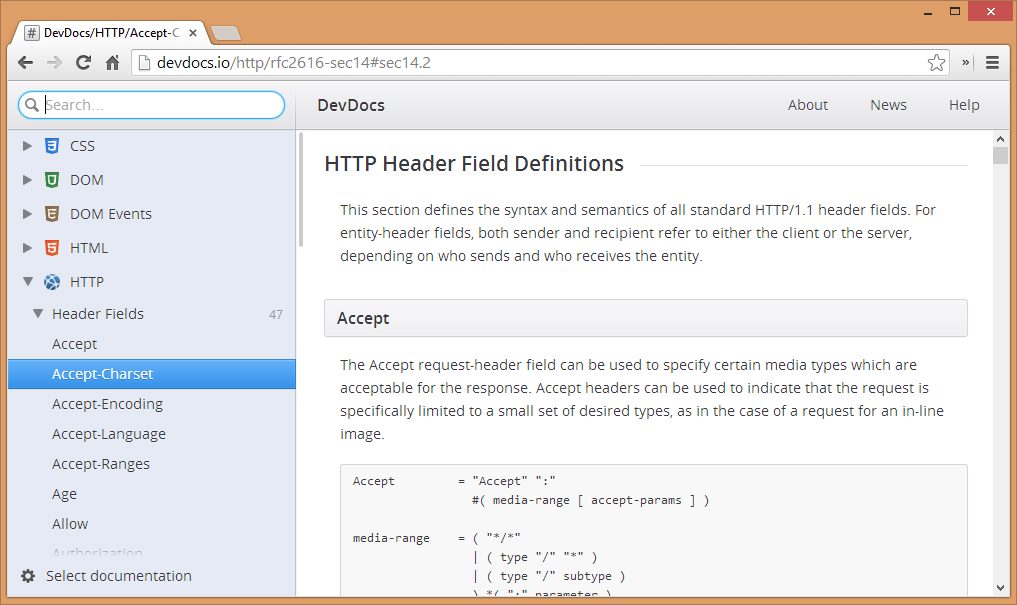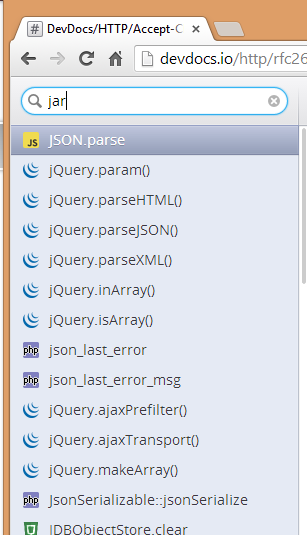How often do you go through the following process when coding?
- Need a [insert programming language here] function definition and examples
- Google for said function
- Click first result which is either w3schools if you’re out of luck, or the online manual of the language you’re dealing with.
- Realize you need another function demoed and explained
- Go back to Google instead of using the search on the language’s website because it’s inexplicably awful and slower than actually reloading the tab after a new Google search
- Rinse and repeat
As a developer who deals in web technologies to a great extent, I’ve encountered this quite a lot. Simply finding the technical definition of a function or statement has become far more difficult than it ever should have been – not in terms of complexity, but in terms of time wasted. Wouldn’t it be great if we could have all our development docs in one place, in a beautiful, offline-enabled interface with a super fast fuzzy search, for any language? Enter devdocs.io.
What is it?
DevDocs is a web app aimed at providing you with quick access to the reference manual of just about every front-end language and library. It lists all the APIs of a given selected language and their official documentation in an easily browsable and viewable format, without the needless menus and tacky attempted styling that official sites like php.net try to pull off.
It’s an Ajax-driven and open source web app with syntax highlighting, even available as a Chrome extension or as a plugin for Sublime Text or Brackets.

What does it do?
It aggregates the reference manuals of all popular languages (provided they have their manuals in an easily accessible and machine-consumable format). It provides you with a slick and fast interface for fuzzy searching the documentation of all selected languages, in order to find the information you need in as few key presses as possible. What’s fuzzy searching, you may be wondering? Fuzzy searching is searching for a string that approximately (not exactly) matches what you entered. It’s what editors like Sublime Text and LightTable use for their command search windows – entering something like “sa” will give you “Save As..”, because the input matches the initials of the command. Entering “delte” will offer results containing “delta” and “delete” and entering “bgcp” will even give you “background clip”. This type of search allows for super-fast fine tuning of results, and since they’re real-time, you can mix and match on-the-spot.

Content
DevDocs downloads the index of the reference manual for the language you select, absorbing it into your local cache from where it serves the results. This does mean you have to redownload the languages of your choice on every new machine, but the speed gain from such a means of operation is far superior to the old fashioned Ajax way of doing things with remote requests. Mind you – currently, only the index is offline, the actual result you click is served from a remote location – for example, you still need internet access to fetch the document for JavaScript Arrays, even though it shows up in the search results even when offline.

It’s important to note that the contents fetched are official-only. This means user submitted entries like comments and samples are ignored.
You can search DevDocs in a specific language scope (for example PHP only) by prefixing your search query with “php” and hitting tab or space (on mobile). This switches search mode to “selected language only”. To exit this mode, simply backspacing out of it does the trick.

Open source and local
DevDocs is open source and encourages the community to contribute in a variety of ways. First off, it’s on GitHub, and invites users to submit issues and improve the code, like any good open source pro
Truncated by Planet PHP, read more at the original (another 3808 bytes)
more
{ 0 comments... » A Look at DevDocs.io read them below or add one }
Post a Comment